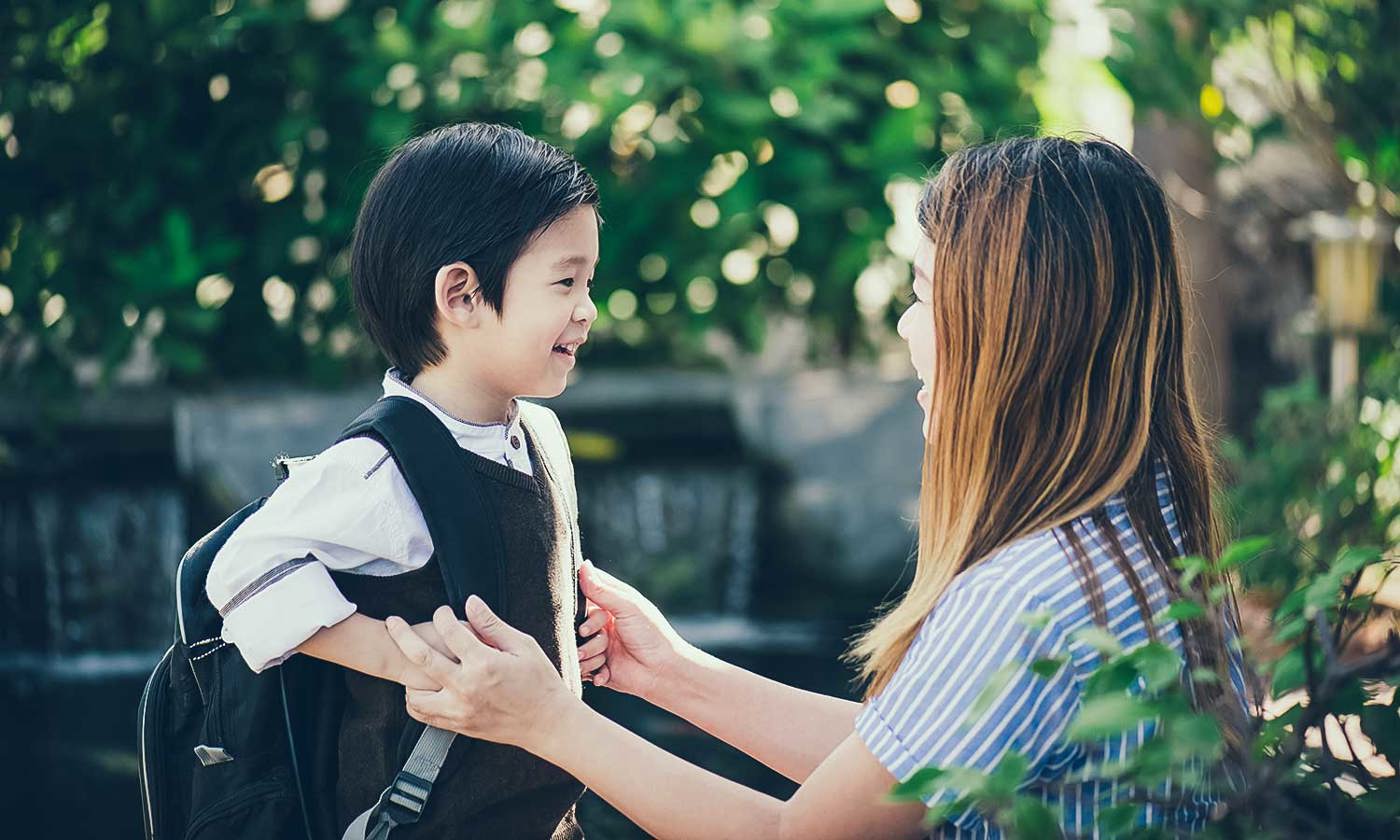Like what you see?
Sign up to receive more free parenting advice.
Thank you for subscribing to our newsletter!
Lifestyle

Credit: iStock.com/anurakpong
Ask anyone who works in the early childhood sector and you’ll soon find out it’s common for friends, family (and sometimes complete strangers) to ask them how they find a high quality service for their children.
It’s completely understandable that young families can be a little anxious about making the right decision as to where to send their little ones.
The information that is available stresses the importance of those first few vital years in a child’s life, and the impact that great experiences can have for their future. In this article you’ll find some simple things to look for, as you navigate finding that special early learning centre that will be able to provide the high quality, early learning and care for your child that you really want.
While there is a lot that makes up a high quality early learning service, there are a few important aspects that are worth understanding a bit more about. These elements work in an integrated way to support children’s learning and care.
High quality early learning and care is underpinned by the relationships educators build with children and families. Positive relationships assist young children to feel safe and secure, and this is a critical foundation for children feeling confident to explore their environments and to learn.Dr Lesley Jones
Relationships and interactions
High quality early learning and care is underpinned by the relationships educators build with children and families. Positive relationships assist young children to feel safe and secure, and this is a critical foundation for children feeling confident to explore their environments and to learn.
Whether the relationship is with a baby, or a five-year-old, relationships should be genuine, responsive and respectful. Relationships are formed through educators and children getting to know one another, over time.
Predictable and stable staffing arrangements and routines are important to getting relationships off to the right start. High quality services spend a lot of time in securing the right people into their teams.
As well as being qualified and knowledgeable, high quality services have educators who genuinely enjoy working with young children and building great relationships.
When visiting centres, look for educators who are engaged with children and families, are welcoming and show delight in being with young children. Interactions should always be respectful, and consider the age and development of the child.
High quality interactions are not just about the business end of things, such as directing children or asking children to do things. High quality interactions provide space to have conversations with children about their interests and discoveries; even with infants who are non-verbal, high quality interactions include these types of sustained genuine interactions.
Early Learning programs and play-based learning
We know children learn best through play; however, many parents wonder how is play-based learning different to play at home or just simply having fun.
Play-based learning is much more than simple fun, although fun should never be undervalued! Play based learning is an approach where children learn about academic concepts, the world around them, independence and relationships with others through experimentation, imagination, testing, rehearsal and practice.
Just about everything important to a young child can be learned through play. High quality programs support a play-based approach because it works best with young children.
That’s not to say it’s not a planned and purposeful approach; just the opposite. High quality programs strike the right balance between; educators intentionally initiating and guiding children’s play and, acting on and extending the play the children have initiated themselves.
In both instances, the educator working in a high quality program, has a deep understanding of the children’s current level of development, emerging strengths and interests so they can plan to support their individual learning.
High quality early learning programs are always developed with individual children in mind. While some whole-group experiences can be seen in older rooms such as the 3 to 5-year-old children, the foundations of a high quality early learning program are a deep understanding, and response, to the individual learning and development needs of each child.
Even when larger groups of children are working collaboratively on a project for example, highly skilled educators nuance the individual learning goals and educational focus for children within the larger piece of learning.
This approach highlights the importance of the relationships that are developed between educator and child. The educators’ deep knowledge of individual children is critical to the quality of the overall program.
As children play, the environments won’t look pristine; messy play and spreading out equipment into large spaces is all part of the learning and fun. However, rooms and playgrounds shouldn’t look uncared for.Dr Lesley Jones
The physical environment
The physical environment is a significant component of a high quality program and influences how children use the spaces and places available to them.
Loris Malaguzzi, founder of the Reggio Emilia movement, identified the environments as the, “third teacher” because of the critical influence the physical environment has on children’s learning.
Environments should provide children with opportunities for safe challenges, places to be quiet and reflective, places to be energetic, places to be by oneself and places to be with friends.
The ways in which environments are thoughtfully organised can send clear messages to children about how spaces can be used, and foster a genuine sense of inquiry and exploration. High quality environments aim to encourage children to make independent choices about where and how they play.
The equipment and resources that are available for children within the physical environments are also an important element.
High quality programs offer children materials and equipment that is flexible in its use, so children can use it in multiple ways to explore and test their thinking.
High quality environments are not necessarily new; in fact, many are not. But there is always careful consideration, by the educator, on how each space; including the outdoor playground, is organised to support learning, development and independence.
Of course, safety, hygiene and general cleanliness are crucial aspects of the physical environment that should always be managed well.
As children play, the environments won’t look pristine; messy play and spreading out equipment into large spaces is all part of the learning and fun. However, rooms and playgrounds shouldn’t look uncared for.
The condition and maintenance of the physical environment are clear indictors of the pride and care the adults take in managing their spaces for, and with, children.
How does all this look in action?
The age ranges for children who access early learning centres covers the time of the most significant growth and change throughout the life-span.
It’s understandable then, that relationships, environments and play-based learning will look different for different age groups to cater for this rapid change.
Below are examples of what each aspect of high quality early learning can look like in different age groups and can be a handy tool for when you next visit a centre.
Infant & toddler
Relationships and interactions
- Educators interacting with infants and toddlers at their own height; and on the floor together. (Indicates respect for infant communication styles)
- Infants and toddlers who seek out their educator and show joy in seeing them. (Indicates good attachment between infant and educator)
- Some children may be eating, while others may be sleeping, while others are playing. (Indicates individual children’s routines and rhythms are being respected)
Play-based learning
- Simple games that educators repeat with a child and wait for the infant cue that they are ready to move to something else. (Infant and toddlers need repetitive and practice play over time to support learning of new concepts)
- Educators singing rhymes, counting or exploring body parts with infants and toddlers during routine times such as meals and nappy change. (Indicates an understanding that learning takes place during normal care routines)
- Educators playing with single children or very small groups (Indicates understanding of infant and toddler need for closer adult scaffolding to support learning and relationship development)
- Displays of the children’s learning, at children’s height, accompanied by explanations of the learning that has taken place. (Supports very young children to retrace the activities they have engaged in and to help families understand the learning that has taken place in their absence)
Physical environments
- Equipment and toys accessible, from low shelves and/or baskets, for infants and toddlers to self-select as interest dictates. (Indicates a respect for infant’s ability to make choice and demonstrate independence)
- High chairs are low to the ground to match the same height of low tables of older children. (Indicates the environment is being organised to support and encourage social interactions at meal times between all children)
- Posters, displays, mirrors etc. are down low at child height. (Indicates the environment is being organised with the physical size of infants and toddler as a primary consideration, rather than adult perspectives)
3 to 5-year-old
Relationships and interactions
- Educators and children in deep discussions about activities or play; children enthusiastic to seek out their educator to share stories, ask for assistance involve them in play; children and educators at ease in each other's company. (Indicates reciprocal relationships and positive bonds between educator and children)
- Children negotiating with each other without conflict; if conflict arises educators support the children through the issue to find a solution together. (Indicates the educators have spent time supporting children to work with others)
- Children engaging in play with friends in pairs and small groups. (Indicates the educators are working at facilitating positive relationships between children)
Play-based learning
- Projects that trace the inquiry of children about a topic are displayed (at child height) and demonstrate multiple curriculum areas such as math, literacy, science as part of the exploration of the topic. e.g. children may have examples of practice writing and drawing about the topic, making models of things from within the topic, photos of group discussions etc. (Indicates an understanding of holistic learning and the weaving of curriculum areas around a topic of interest to children. Also, evidence of educator’s ability to stretch and extend children's initial interest and understanding of a topic)
- Small groups of children engaged in a range of activities inside, or outside, at any one time. (Supports children’s diverse interest areas for play and exploration and provides more opportunities for social engagement between children)
- Children moving equipment from one section of the room to their play e.g. bring dolls and cars into the construction area. (Indicates educators are supporting children to extend their thinking and independence to develop richer play)
Physical environments
- Equipment and resources available for children to self-select, use and self-manage. (Indicates respect for children’s growing sense of independence and abilities and capability to be responsible for their own environment)
- Well-resourced and clearly defined areas in the room for different types of learning experiences e.g. Writing area, dress up area, construction area. Resources & props to add to play are available such as cardboard boxes, paint, sticky tape, material swatches. (Indicates educators understanding of the growing complexity and imagination in play for older children. This complex child initiated play requires a broad range of accessible resources to fully support and extend the learning)
- Children’s belongings are easily accessible for children including food, clothing, bags etc. (Indicates the environment has been respectfully organised with children’s growing capabilities for independence and autonomy in mind)




